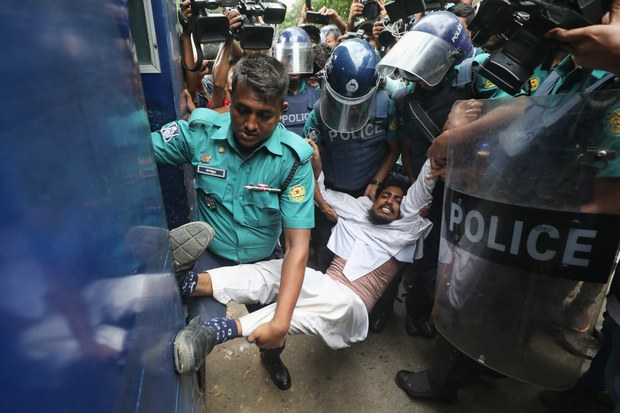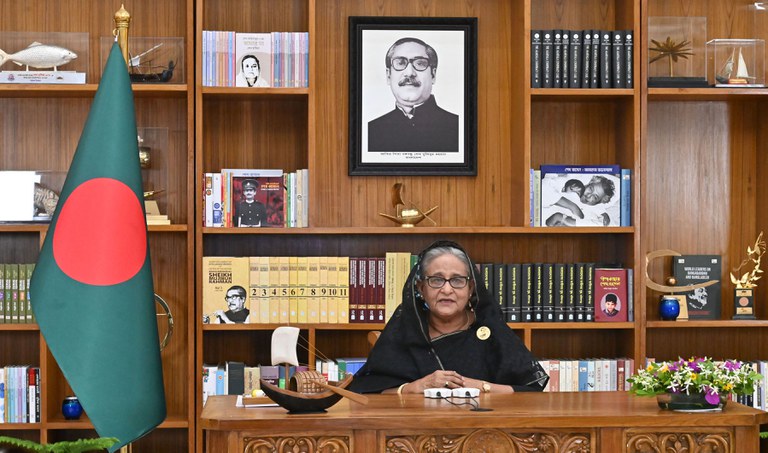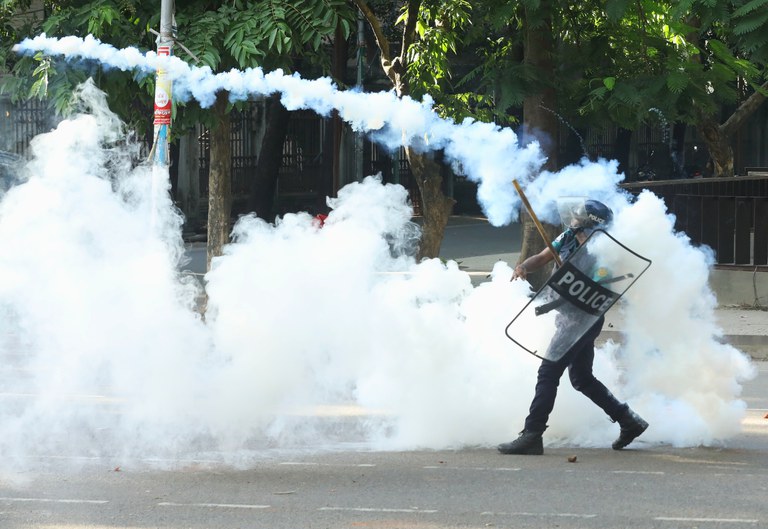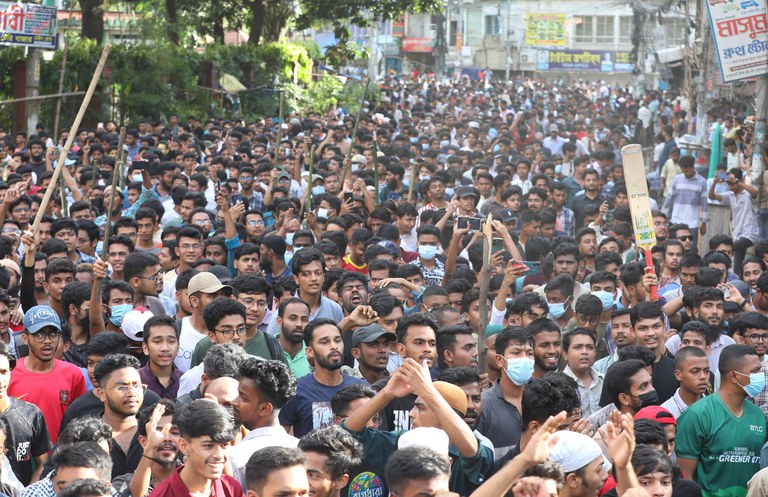Bangladesh PM tells anti-quota protesters court ruling will not disappoint
2024.07.17
Dhaka
 Police drag a student protesting against a quota system for government jobs from the Dhaka University campus toward a prison van, July 17, 2024.
Police drag a student protesting against a quota system for government jobs from the Dhaka University campus toward a prison van, July 17, 2024.
Four days after nationwide protests began over a quota system for government jobs that left seven people dead, Prime Minister Sheikh Hasina told Bangladeshis on Wednesday evening that the top court is dealing with it and they would “not be disappointed.”
Hasina, leader of the ruling Awami League, addressed the nation at a time when thousands of students from almost all public and private universities have poured onto the streets to protest the system they say benefits only those who support the prime minister. An analyst said it has created the worst political incident involving student protests in years.
“I earnestly request all to wait with patience until the final verdict of the apex court comes. My belief, our students must get justice from the higher court; they should not be disappointed,” Hasina said in her address without elaborating about when the court would rule.
She said her government has shown patience even as students launched their protests.
“But it is a matter of deep sorrow that a vested-interest group got involved in terrorist activities to achieve their vicious goal out of the protest,” she said while extending her condolences to those killed in different parts of the country.
BenarNews based its original death toll of six on reports provided by hospital officials in several cities. On Wednesday, the officer in charge of the Dhaka Medical College Hospital police outpost confirmed that the body of a dead protester had been taken to the hospital.
“I categorically announce those perpetrating murder, looting and terrorist activities, no matter who they are, must face due punishment,” Hasina said. “I also announce a judicial inquiry will follow to investigate the unwanted incidents including murder for the sake of fair trial and justice,” she said.
The student protests began last week after the High Court in June reinstated a quota that reserves 30% of civil service jobs for relatives of those who fought in the 1971 war that resulted in Bangladesh’s independence.
Hasina’s speech did little to quell the protests. In a Facebook post, Asif Mamud, a coordinator of the Students Movement against Discrimination, announced there would be a “complete shutdown” across the nation on Thursday to protest against the quota.

The government on Wednesday closed all academic institutions including universities across the country and slowed wireless internet. On major university campuses, police forced students to comply with an order to vacate the dormitories.
A civil society activist said that similar student protests six years ago were about both the quota system and student fatalities on dangerous roads.
“Though the anti-quota movement took place earlier in 2018, it did not take such a large scale and Prime Minister Sheikh Hasina has not been seen such trouble in any movement in the recent past,” said Badiul Alam Majumdar, a leader of Shushashoner Jonno Nagorik, a civil society group headquartered in Dhaka.
Majumdar said the quota issue could have been solved easily while noting it is rare for educational institutions to be closed indefinitely.
“Firing tear gas at students’ dormitories to oust them from their campuses is also a shocking and rare incident in the country,” he told BenarNews.
Meanwhile, a political analyst, professor Nizam Uddin Ahmed of Chittagong University, said that Hasina had acknowledged the students’ grievances.
“The prime minister in her address to the nation has condoled the loss of life in the protest and offered something that the students can think about positively. ‘The students will not be disappointed’ is a message the prime minister has communicated to the people and the judiciary,” he told BenarNews.
“In other words, it can be construed that she wants a reform to the government quota system,” he said.
Ahmed said the students’ protests were sparked by a statement from the chief justice that such actions cannot change verdicts.
“At the same time, the government also mishandled the movement. Why did they unleash Chhatra League on the students to quell the protest? It backfired,” he said, referring to the student wing of the ruling Awami League.

According to Ahmed, the crushing of the 2018 protests by police and the Chatra League is an underlying factor in the current unrest.
“This made Chhatra League an uncontrollable force at all education institutes,” he said, adding the group is getting priority treatment for government jobs.
“The Chhatra League did not allow the students to express their opinions,” Ahmed said. “And the students ultimately rose against them.”
Internet bandwidth cut
Authorities on Wednesday reduced the bandwidth of mobile internet service used by the protesters to communicate and share videos and photos on social media platforms such as Facebook.
Zunaid Ahmed Palak, state minister for information and communication technology, blamed social media for the violence.
“The social media sites are rife with fake news and rumors. These should be checked,” he told BenarNews.
Tanvir Hasan Zoha, a cyber security expert, said the government should not reduce mobile internet service, in this case, to 2G levels.
“The 2G network is similar to blocking the internet. But the protesters are using the VPN to use Facebook and other social media sites. The common people, businesses, IT-based firms and freelancers are affected by the ban,” he told BenarNews.

“After every protest, the government bans social media to control the protests – but this should not happen,” he said.
International reaction
In a Wednesday Facebook post, Volker Türk, the United Nations human rights chief, urged the government to engage with the protesting students.
“All acts of violence and use of force, especially resulting in loss of life, must be investigated and perpetrators held to account. Freedom of expression and peaceful assembly are fundamental human rights,” it said.
His post followed a Tuesday statement during a press briefing from Stéphane Dujarric, spokesman for the U.N. secretary-general, that the protests are being followed closely.
“I think whether it’s in Bangladesh or anywhere else in the world, people have a right to demonstrate peacefully and we call on the government of Bangladesh to protect the demonstrators against any form of threat or violence, and especially those who may be in protesting peacefully who may need extra protection, such as young people or children or people with disabilities,” he said.
In Washington, a U.S. State Department spokesman made a similar statement.
“The freedom of expression and peaceful assembly are essential building blocks of any thriving democracy, and we condemn any violence against peaceful protesters. Our thoughts are with those who have been impacted by this violence,” spokesman Matthew Miller said on Monday.







